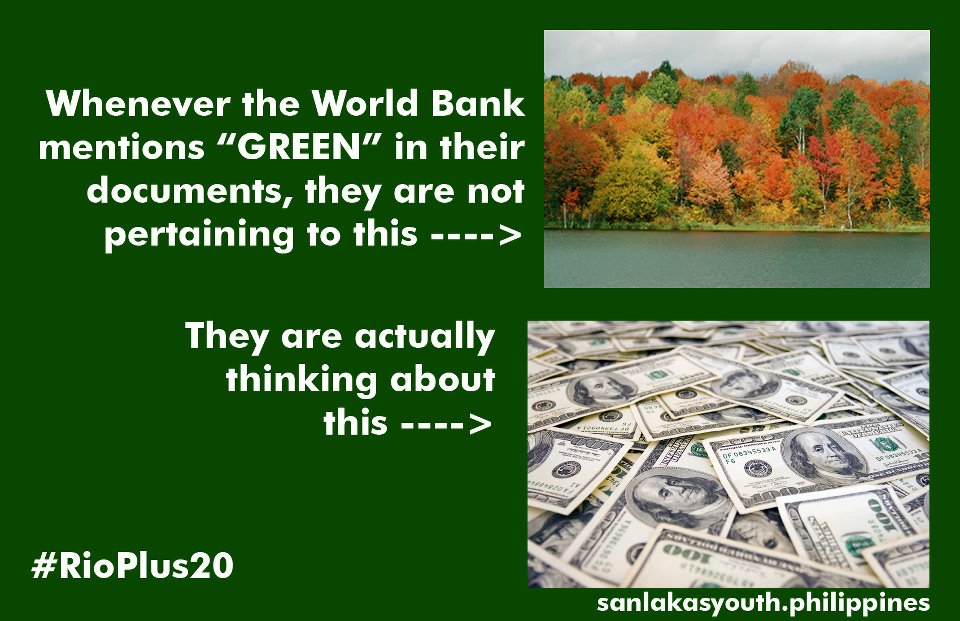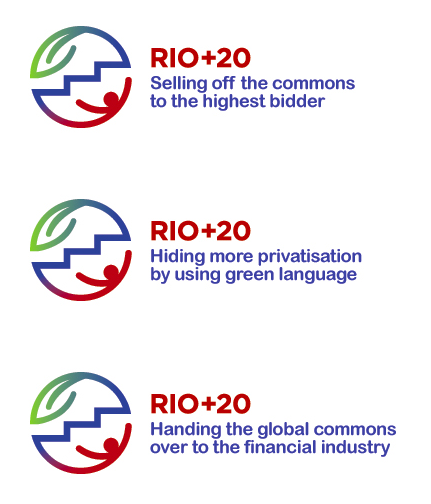The Rio +20 People’s Summit is focussing on the problem that the United Nations, like many member states, seems to have effectively been captured by the private sector. The Climate Connections article says, “In the lead-up to the summit, major corporations positioning themselves to benefit from the market mechanisms being promoted have launched a greenwashing onslaught…”
Tag Archives: green economy
Stop treating nature as a commodity
Pablo Solon, Director of Focus on the Global South, argues that the European Union’s pursuit of “the green economy” isn’t a solution for Rio+20.
This is the view of Sanlakas Youth UP Diliman:
Rio +20 – tell Nick Clegg we want environmental justice, not financial markets for natural resources
The World Development Movement has organised an email petition to Nick Clegg, who is the UK representative at Rio+20 in June. It asks him to make sure that the Rio+20 agenda focusses on environmental justice – not, as the rich G8 countries want, on creating financial markets for natural resources.
You can find out a bit about this idea of treating the environment as a source of “environmental services” that can be monetarised and traded, in the environmental services section of the Energy Royd Land page.
You can find out more about the issues and sign the petition here.
Commons-based law – instead of marketisation of “environmental services”
Instead of extending the market into environmental resources which are basically priceless because nothing else can exchange or substitute for them, a new system of Commons-based law would provide practical, democratic ways of protecting value that the market can’t achieve, because the market is essentially about consuming and profiting from natural resources.
Commons-based law would start from the premise that the environment is a common good that exists on its own terms. It would require us to adopt a biocentric rather than anthropocentric (human-centred) view of the environment.
According to the founders of the Commons Law Project, Commons-based law
“…asks questions such as: How can appropriate limits be set on the market exploitation of nature? What legal principles, institutions and procedures can help manage a shared resource fairly and sustainably over time, sensitive to the ecological rights of future as well as present generations?”
If you’re interested in the idea of Commons Law, you might also like to read about the proposal to create a law prohibiting Ecocide – the destruction of ecologies.
The importance of the commons in tackling climate change
From David Bollier’s blog
Planning for the Rio+20 Conference: Enter the Commons?
The Rio+20 conference in Rio de Janeiro this June will be a major event in the world’s ecological history. The event, officially the United Nations Conference on Sustainable Development, will provide an opportunity for the world’s nations to take stock of what has happened to the environment since an earlier, landmark conference in Rio in 1992 – climate change, loss of biodiversity, species extinctions, desertification, etc., etc. – and to plot ambitious strategies to save the planet in the coming decades.
But don’t hold your breath. The world’s governments are not likely to come up with anything significant. The G-20 nations, which have been described as the “executive board of the world,” have little interest in bold political and institutional reform. That would only disrupt the desperate search for economic growth. An open, candid inquiry into the growth economy, consumerism and the finite carrying capacity of Earth’s biophysical systems would be far too politically explosive. It is far easier to talk about a “green economy,” as if greater efficiencies alone will save the planet.
Continue reading




